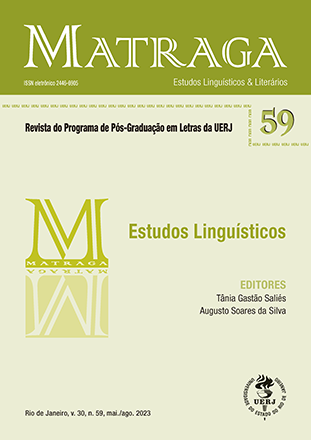“Running after my dreams”: How refugee and immigrant students conceptualize the experience of pursuing a university degree in Brazil
DOI:
https://doi.org/10.12957/matraga.2023.74302Keywords:
Metaphor, Metonymies, Portuguese as a welcoming language, Language learning.Abstract
This study aims to investigate how immigrant and refugee students preparing to start a Brazilian public University conceptualize their experiences. Our goal here is to analyze their use of figurative language to talk about their views, experiences, and plans. In the light of Cognitive Linguistics and at an interface with Applied Linguistics, we identify, analyze, and interpret figurative language, especially metaphors and metonymies (LAKOFF; JOHNSON, 1980; CAMERON et. al., 2009) that emerge in an interview with two Haitian students, a classroom interaction with an Asian student, and field notes of this interaction. Students talked about how they experience Brazilian society, their views of how it is to be a student in Brazil, their experiences as learners of Portuguese as a Welcoming language, and their plans. Building on previous work by Oliveira and Ferreira (2016), Gualda (2020), Ferreira et al. (2022), the results point to the use of conceptual metaphors such as education is commodity, education is a journey, learning is key to success, and learning is struggle. Issues such as their hybrid identities as immigrant and refugee students in Brazil, as well as their new identities as future Brazilian citizens (or not), emerged in the talk.
---
Original in English.
Downloads
Downloads
Published
How to Cite
Issue
Section
License
Authorization
Matraga – Scientific Journal of the Post-graduate Program in Arts and Humanities of UERJ is authorized to publish the article submitted here, if it is accepted for online publication. It is attested that the contribution is original, that it is not being submitted to another publisher for publication, and that this statement is the expression of truth.
The works published in Matraga's virtual space – Scientific Journal of the Post-graduate Program in Arts and Humanities of UERJ will be automatically transferred, and your copyright is reserved to Matraga. Its reproduction, in whole or in part, is conditional on the citation of the authors and the data of the publication.

Matraga uses license Creative Commons - Attribution-Non-Commercial 4.0 International.





